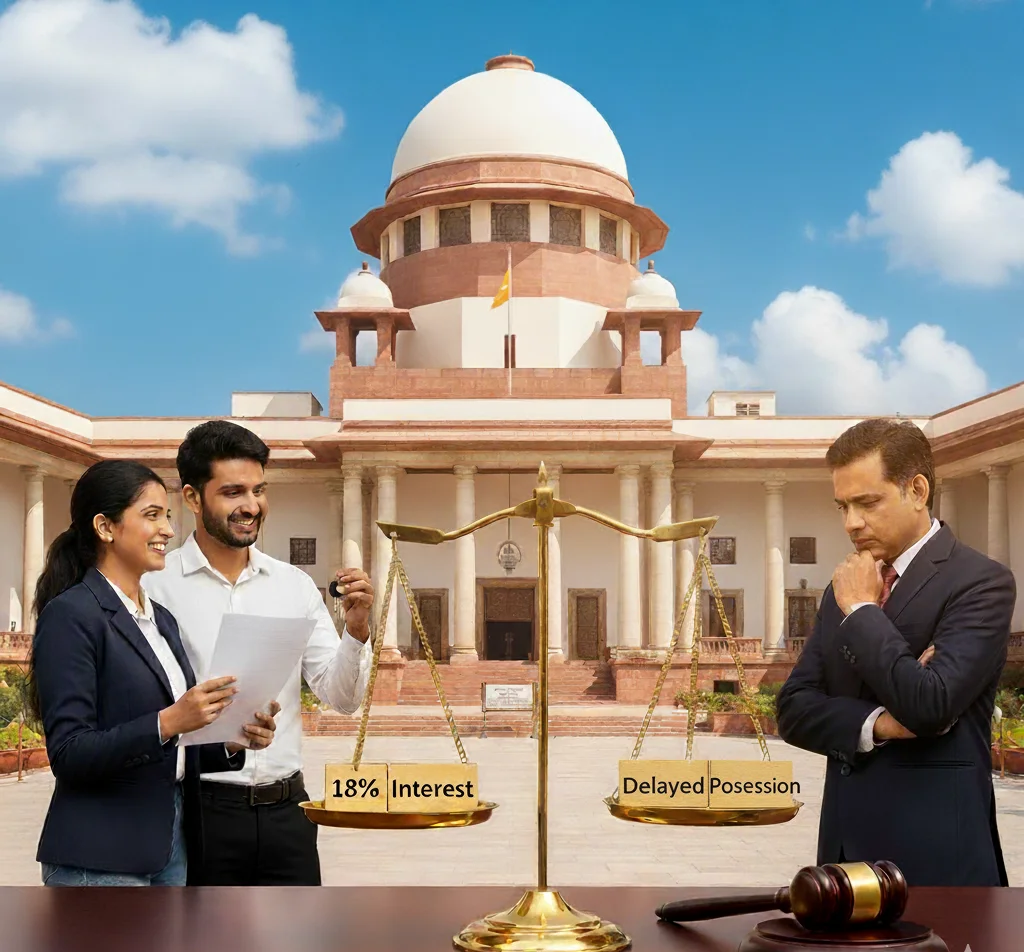⚖️ Supreme Court’s Landmark Ruling: Builders Must Pay 18% Interest for Delayed Possession
🏠 A Big Win for Homebuyers Seeking Justice
In a major boost for homebuyers’ rights, the Supreme Court of India has ruled that real estate developers must pay the same rate of interest to buyers for delayed possession that they charge from them for late payments. This judgment reinforces the principle of fairness and accountability in the real estate sector and brings hope to thousands of buyers waiting for their homes.
For years, builders have imposed high penalties—sometimes up to 18% interest—on buyers for delayed payments. However, when builders fail to deliver projects on time, they often escape with minimal consequences. The Supreme Court’s latest verdict corrects this imbalance and ensures that both sides follow the same rules.
🧾 The Case That Sparked the Verdict
The case centered around a buyer who booked a plot in the Park Land Project in Haryana back in 2006 for ₹36.03 lakh. Over the years, the buyer paid nearly ₹43.13 lakh but never received possession. Instead, the builder offered an “alternative plot” and even demanded additional payment along with 18% interest for alleged delays in the buyer’s installments.
Tired of waiting for more than a decade and facing mounting stress, the buyer decided to terminate the agreement in 2017. He then approached the National Consumer Disputes Redressal Commission (NCDRC) in 2018, seeking a refund.
In 2023, the NCDRC directed the builder to refund the principal with 9% interest. However, the buyer felt the compensation didn’t reflect the harassment and loss he endured and took the case to the Supreme Court.
⚖️ Supreme Court’s Strong Stand on Fairness
A bench of Justices Dipankar Datta and AG Masih heard the matter and ruled that the NCDRC’s 9% interest was inadequate. They directed the builder to pay 18% simple interest, the same rate it had charged the buyer.
The court emphasized that equity and fairness require equal treatment. It stated:
“If the builder charges 18% interest for delays by the buyer, the same rate must apply when the builder defaults. Anything less would perpetuate an unfair bargain.”
The judgment clearly signaled that builders cannot impose one-sided terms while escaping accountability for their own delays.
💡 Why This Verdict Matters
This decision represents a major shift in how courts handle disputes between buyers and developers. For far too long, buyers have faced the double burden of financial strain and emotional distress due to delayed projects. Now, the law stands firmly on their side.
The ruling ensures that:
- Builders will think twice before delaying possession.
- Homebuyers will receive fair compensation for long delays.
- Contracts will carry balanced terms, preventing exploitation.
By applying the same interest rate for both parties, the Supreme Court promotes transparency and accountability, encouraging the industry to operate more ethically.
🧠 Expert Opinion: A New Era of Accountability
Legal experts hailed the decision as a turning point in consumer protection law. Sunil Tyagi, Managing Partner at ZEUS Law Associates, said the principle of fairness applied by the Supreme Court will deter builders from delaying projects.
He added, “This judgment reaffirms that homebuyers deserve justice and compensation proportionate to their suffering. The interest rate may differ case by case, but the message is clear—builders must face equal consequences for their defaults.”
🏗️ Industry Reaction: Sanjeev Singh Welcomes the Move

Sanjeev Singh, Managing Director of SKJ Landbase, welcomed the verdict, calling it a game-changer for the real estate sector. He said:
“This ruling will reshape the relationship between buyers and developers. It’s not just a legal decision—it’s a moral one. When a buyer invests hard-earned money, timely delivery is not a favor, it’s an obligation. The Supreme Court has ensured that fairness prevails.”
He further added,
“This verdict will bring greater transparency, discipline, and trust in the real estate ecosystem. Developers who deliver on time have nothing to fear. Those who delay must now face the same consequences they impose on buyers. It’s a big step toward a more ethical and consumer-friendly industry.”
Sanjeev Singh believes this decision will motivate responsible builders to stick to deadlines and encourage buyers to invest with renewed confidence.
🔍 What Homebuyers Can Learn from This
- Check builder contracts carefully: Ensure the interest terms apply equally to both parties.
- Document all payments and communication: Keep records to strengthen your case in disputes.
- Take timely legal action: Consumer forums and courts now actively support fair compensation.
- Stay informed: Awareness is the first step toward protection.
🚀 Final Thoughts: A Step Toward Justice and Trust
The Supreme Court’s ruling marks a new chapter for India’s real estate sector. It places buyers and builders on equal footing, ensuring that delays no longer go unpunished. For homebuyers, this verdict brings hope, justice, and confidence that their rights will be protected.
More importantly, it signals a shift toward ethical business practices—where commitments are honored, and fairness isn’t optional but essential.
As India’s property market continues to grow, this decision will help build a more trustworthy and transparent industry—one that truly serves its customers.



